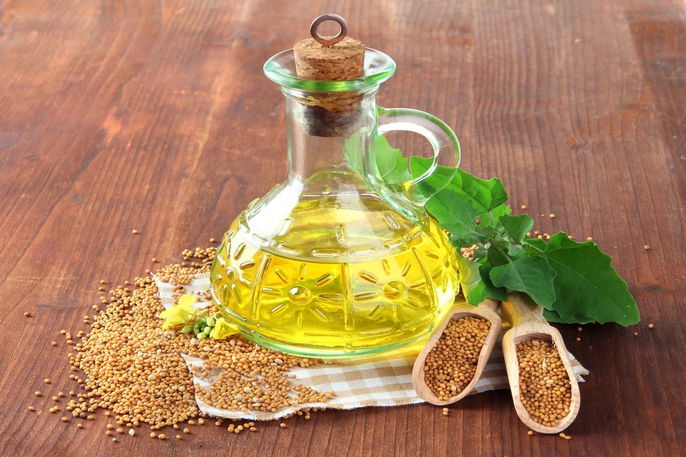Mustard is a plant that produces a seed an intense and spicy flavor. This seed is often used to make condiments or sauces for meats, vegetables and salads, however mustard leaves can also be consumed.
Mustard seeds and leaves contain sulfuric compounds, calcium, zinc, potassium, vitamin E and vitamin K. Additionally, the leaves are rich in fiber and antioxidants, which can help relieve constipation, but also lower cholesterol and prevent degenerative diseases.
Despite its health benefits, excess consumption of sauces made from mustard seeds can cause vomiting, stomach or intestinal irritation and abdominal pain. They should generally avoided by people with gastrointestinal problems.

Health benefits
The main health benefits of mustard are:
1. Preventing premature aging
Due to its high levels of vitamin E and vitamin A, nutrients that have an antioxidant effect, mustard can give your skin a firmer and fresher appearance It works by combating free radical damage in skin cells.
Mustard seeds are also rich in omega 9, which increases the absorption of vitamin A and E to promote skin health.
2. Strengthening the immune system
Mustard can boost your immunity as it contains vitamin A and vitamin E, nutrients that help to keep your natural defense cells health. This can improve the immune system's response to infections caused by viruses, bacteria or fungi .
Also recommended: Immune System Boosters: Foods, Natural Remedies & Recipes tuasaude.com/en/immune-system-boosters3. Reducing the risk of cardiovascular diseases
Mustard seeds are rich in good fats, such as omega-3, which helps reduce levels of "bad" cholesterol, LDL, total cholesterol and triglycerides.
Due to its antioxidant properties, mustard also prevents the accumulation of fat within blood vessels and promotes optimal circulation, reducing the risk of developing cardiovascular diseases like atherosclerosis, heart attack or stroke.
Check-out other omega-3 foods you can include in your diet to reduce your risk for heart disease.
4. Regulating the gut
Mustard can regulate the intestines as it is rich in fibers that stimulate natural bowel movements and increases stool volume. This can make bowel movements easier and help to manage constipation.
5. Promoting wound healing
Mustard can help with wound healing because it has anti-inflammatory and antimicrobial properties that can prevent infections and reduce inflammation in the area.
Furthermore, because it contains vitamin K, mustard also has an effect on blood clotting. It can prevent excess bleeding and accelerating the healing process.
6. Helping prevent cramps
Yellow mustard can help prevent muscle cramps caused by intense exercise. The acetic acid present in mustard improves the action of acetylcholine, a neurotransmitter that is involved in muscle contraction and relaxation. This can help to prevent or relieve cramps.
However, more studies are still needed to prove the possible benefits of mustard on cramps.
Nutritional information
The following table outlines the nutritional information for 100 grams of mustard leaves and seeds:
To obtain all the benefits and nutrients that mustard has to offer, it is important to include it is in a healthy lifestyle with a balanced diet and plenty of exercise.
How to consume
Mustard can be consumed in seed form, which can be used to prepare sauces or as a seasoning for meat and roasts. Mustard leaves can also be consumed raw or cooked, and added to salads, stir-fries or recipes such as pies, soups or rice.
Although there is no recommended amount of mustard per day, the recommended minimum daily intake of greens is 2 to 3 servings per day, which is equivalent to between 160 and 240 g per day.
However, the recommended amount of mustard may also vary depending on each person's nutritional needs. Therefore, you are advised to consult a registered dietitian for a thorough assessment, so that your servings of greens can be recommended.
Healthy recipes
Some mustard recipes that can be included in your daily diet include:
1. Sauteed mustard leaves
Ingredients
- 10 mustard leaves, cut into strips
- 1 onion
- Salt and olive oil to taste
Directions
Cut the onion into small pieces and place in a frying pan with olive oil. Once the onion becomes transparent, add the mustard leaves and a little salt and stir together until well sautéed. Then place it in a bowel and serve as side.
2. Mustard omelet
Ingredients:
- 1 egg
- Mustard leaves, chopped
- Salt and black pepper to taste
- Optional: cheese, onion, tomato and/or chicken
Directions
Beat the egg with a fork together with the chopped mustard leaves and salt and pepper. Then place the mixture in a frying pan and let it brown on both sides.
In addition to the mustard leaves, a slice of white cheese or fresh cheese, shredded chicken, onion and tomato can be added. This can make the omelet more nutritious.
3. Honey mustard sauce
Ingredients:
- 3 tablespoons of mustard seeds
- 50 ml of white wine
- 1 tablespoon of honey
- 1 pinch of salt
- Seasoning as desired: black pepper, garlic powder, tarragon or paprika
Directions
Pour the mustard seeds and white wine in a blender and mix until you obtain a smooth paste. Then add seasoning (as desired) and the honey and mix again. This sauce can be used as a salad dressing. Its mild flavor makes it a great accompaniment to any type of salad.
4. Mustard Seed Chicken
Ingredients:
- 1 chicken breast
- 1 teaspoon of mustard seeds
- 2 tablespoons of olive oil
- 1 onion
- 2 carrots
- 1 pinch of salt
- Seasoning, as desired
Directions:
Cut the chicken breast into cubes and add 1 tablespoon of olive oil, salt, seasonings and mustard seeds. Cut the carrots and onion into thin slices and place on a tray. Drizzle with another spoon of olive oil and sprinkle a pinch of salt over these. Place the chicken cubes on top of the vegetables and bake at 200ºC (390ºF) for 20 minutes. Serve with a salad.






























